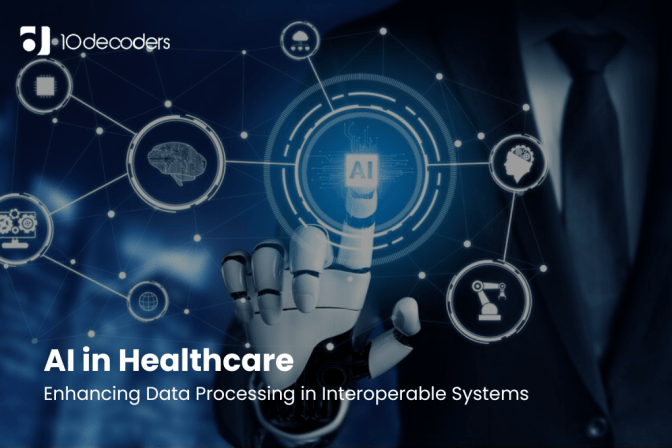AI in Healthcare: Enhancing Data Processing in Interoperable Systems
The healthcare industry is undergoing a seismic shift thanks to the integration of Artificial Intelligence (AI), particularly in data processing. This blog explores the multifaceted ways AI is transforming the handling, analysis, and utilization of healthcare data, heralding a new era in medical innovation and patient care.
Transforming Healthcare Data Processing with AI
In healthcare, the data is vast and complex, spanning patient histories, clinical studies, and more. Traditional methods struggle to keep pace with the sheer volume and intricacy of this data. Enter AI, with its advanced algorithms and machine learning capabilities. AI in healthcare is not just about automation; it’s about enhancing the ability to process, interpret, and leverage vast datasets more efficiently and accurately than ever before.
AI’s Role in Advanced Data Analysis
AI excels in extracting meaningful insights from large datasets. By employing machine learning and deep learning, AI systems can detect patterns and correlations that might otherwise go unnoticed. This is particularly crucial in predictive analytics, where AI algorithms forecast health trends and potential risks. Such insights are invaluable for preventative healthcare, allowing for timely interventions and better patient outcomes.
Improving Data Accuracy and Accessibility
Accuracy in data processing is paramount in healthcare. AI algorithms enhance data accuracy, identifying and correcting errors and inconsistencies. This precision is vital in diagnosis and treatment planning. Moreover, AI organizes data in a more accessible manner, streamlining the decision-making process for healthcare professionals. The accessibility of accurate data is a cornerstone of efficient healthcare delivery.
Enhancing Research and Development
AI’s impact on medical research and development is profound. It processes data from various sources – clinical trials, medical records, and scientific literature – rapidly and efficiently. This capability accelerates the pace of medical research, leading to quicker development of new treatments and medications. AI-driven data processing is a catalyst for innovation in healthcare, pushing the boundaries of medical knowledge and capabilities.
Streamlining Data Security and Compliance
Data security and compliance are critical in healthcare. AI systems ensure the integrity and confidentiality of sensitive medical data. By monitoring data access and usage patterns, AI can flag potential security breaches. Furthermore, AI aids in maintaining compliance with ever-evolving healthcare regulations and privacy laws, ensuring that data processing adheres to legal and ethical standards.
AI in Predictive Analytics and Personalized Medicine
One of the most exciting applications of AI in healthcare data processing is in predictive analytics and personalized medicine. By analyzing patient data and broader health trends, AI can predict individual health risks and outcomes. This level of personalization extends to treatment plans, where AI-driven analysis tailors therapies to individual patient needs, considering factors like genetic makeup and lifestyle.
Overcoming Challenges in AI Implementation
While AI’s potential in healthcare data processing is immense, there are challenges in implementation. Ensuring the quality and diversity of data fed into AI systems is crucial to avoid biases. There’s also the task of integrating AI within existing healthcare infrastructures, which requires substantial investment and training. Overcoming these challenges is key to fully realizing AI’s potential in healthcare.
Enhancing Clinical Decision-Making with AI
AI’s role in enhancing clinical decision-making is pivotal. By processing and analyzing vast datasets, AI provides healthcare professionals with actionable insights and evidence-based recommendations. This level of support is invaluable in complex cases where nuanced decision-making is critical. AI’s ability to quickly analyze patient data against a backdrop of medical research and historical health records leads to more informed, accurate, and faster clinical decisions. This not only improves patient outcomes but also significantly reduces the cognitive load on healthcare providers, enabling them to focus more on patient care and less on data analysis.
AI and the Future of Healthcare Workforce
The integration of AI in healthcare is reshaping the workforce landscape. By taking over repetitive and data-intensive tasks, AI allows healthcare professionals to focus on more complex and empathetic aspects of patient care. This shift is leading to a new paradigm in healthcare employment, where the emphasis is on collaborative interaction between human intelligence and artificial intelligence. Training and education in healthcare are also evolving, with a growing focus on developing skills for working alongside AI systems. This evolution presents opportunities for more specialized roles and underscores the importance of continuous learning in a rapidly advancing technological environment.
Bridging the Gap in Global Health Disparities
AI has the potential to play a significant role in bridging global health disparities. By efficiently processing large datasets, AI can provide insights that inform healthcare strategies in resource-limited settings. It can aid in identifying disease patterns, predicting outbreaks, and optimizing resource allocation. This is particularly crucial for global health, where access to healthcare varies widely. AI-driven data processing can guide the deployment of medical resources where they are most needed, improving healthcare accessibility and outcomes in underprivileged areas. This democratization of healthcare information and resources exemplifies AI’s far-reaching impact beyond individual healthcare systems.
Conclusion: The Future of AI in Healthcare Data Processing
AI is more than just a technological advancement in healthcare; it’s a paradigm shift. The ability to process complex datasets with unprecedented efficiency and accuracy is setting the stage for a revolution in healthcare. From enhancing patient care to accelerating medical research, AI’s role in healthcare data processing is pivotal. As AI technology continues to evolve, it promises to reshape the future of healthcare, making it more data-driven, personalized, and effective than ever before.



